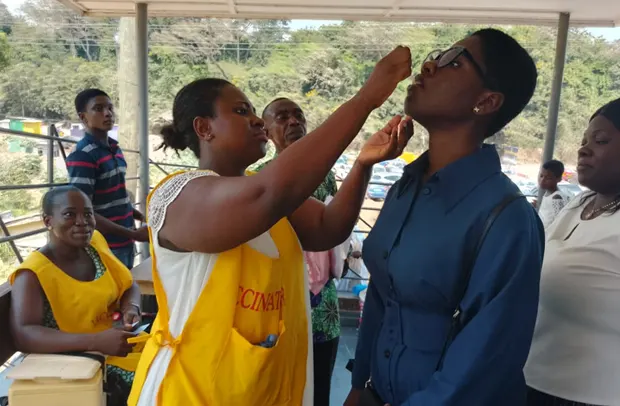Health personnel administering the oral vaccination to residents
The Western Regional Health Directorate of the Ghana Health Service (GHS) yesterday began administering oral cholera vaccine to residents within the region.
The exercise was necessitated by the increasing number of recorded cholera cases and its related deaths in the region.
The number of deaths in the region has increased from the initial 8 to 15 and the cases recorded currently stand at 800.
The oral cholera vaccine was administered to people from the age of one year and above, excluding, pregnant women and lactating mothers.
The exercise will end on Thursday, December 19, 2024.
The objective was also to help raise the residents’ immunity against the viral disease and break the transmission of the disease.
Regional Director of Health, Dr. Nana Yaw Ofori Yeboah, indicated that the vaccination exercise is taking place at various health facilities and other places including churches.
He mentioned that, the Ministry of Health has provided equipment and other services to health facilities in the Region to help deal with the situation.
However, he cautioned the public to stay alert and adhere to the safety protocols and basic precautions such as washing of hands with soap under running water before eating, eating warm foods, adhering to all sanitary precautions, and avoiding open defecation.
He mentioned some of the symptoms of the disease as nausea and vomiting, leg cramps, restlessness, irritability, weakness, dry mouth, sunken eye, and extreme thirst.
He told the residents that as soon as anybody starts showing the signs and symptoms of the virus, that person should report immediately to the nearest health facility.
Deputy Director for Public Health, Gifty Amugi, explained that cholera is an acute feaco-oral diarrhea disease caused by vibro cholerae.
She revealed that 90% of the cases recorded are from the Sekondi-Takoradi Metropolis and Effia-Kwesimintsim Municipal Assembly.
She also mentioned the risk factors as eating and drinking food contaminated with the disease, poor sanitation, open defecation and contact with an infected person and among others.
It would be recalled that the Regional Coordinating Council last week placed a ban on the sale of vegetables by food vendors as part of precautionary measures to curb the spread of the disease.
From Emmanuel Opoku, Takoradi


